By James McMahon
When the dust settled at Croke Park on that balmy September Sunday, a familiar sight emerged as Kerry once again laid claim to Sam Maguire. In truth, we had expected the Kingdom to have some say at the business end, but not in the denouement.
We know all about Kerry's pedigree, but in 2014 the prevailing view was that they did not have all the building blocks in place to bring home the big prize.
Credit then to their boss Eamonn Fitzmaurice for his astute construction. A process that began minus the notable pillars of Colm Cooper, Tomás Ó Se and Paul Gavin. Indeed the Fitzmaurice project looked on shaky ground when they were five points down with as many remaining in the drawn All-Ireland semi with Mayo.
The introduction of Kieran Donaghy, with his aerial dominance, helped bolster Kerry’s resolve. In the replay – a game for the ages on Shannonside – the Green and Gold held their nerve to prevail after extra time.
And so to the final. Hardly a thing of beauty!
Kerry set about adapting their game to the Donegal threat. It was not the Kerry we know. James O’Donoghue did not score on the day as other duties took priority.
Misfortune befell Donegal keeper Paul Durcan at a crucial stage in the second half. Kieran Donaghy profited to coolly find the net.That score in the end was the difference between the sides.
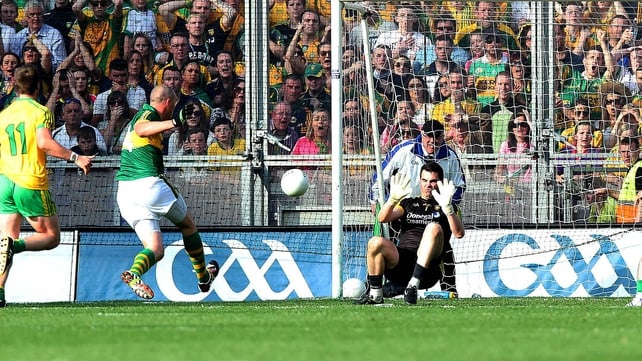
However, in summing up the contest as a whole, Kerry were slightly better in nearly all departments. Jim McGuinness accepted afterwards that his side did not perform to the level he had hoped for, while also pointing no blame in the direction of Durcan.
Kerry have now won 37 All-Ireland titles and with their minors also triumphant on 21 September under the shrewd guidance of former senior manager Jack O’Connor, the future looks far brighter now than it did in the early months of this year.
2014 - Far from a vintage year
Aside from Monaghan v Kildare in the rain, Cork’s second-half rally against Mayo in the All-Ireland quarter-final and the three games played at the semi-final stage, the championship offered little in the way of excitement.
Three of the four provincial finals were one-sided, while the other, Donegal v Monaghan in Ulster, was a dour affair illuminated only by the Donegal celebrations at the final whistle.

The qualifiers did not throw up too many shocks, though Longford’s win over Derry in Celtic Park was unexpected. Subsequently Tyrone’s defeat to Armagh caught the eye.
However, Armagh’s journey thereafter underlined their growing potential and with Kieran McGeeney now at the helm, they will look to get back to the level that saw them challenge for honours in the 2000s.
Tipperary and Clare did put it up to Cork and Kerry respectively in Munster and were just as competitive through the back door.
In Leinster, the gap between Dublin and the rest appears to be growing. Laois were competitive against the Dubs for about 50 minutes of their quarter-final clash but couldn’t sustain it in the home stretch.
Meath were comfortable winners over Kildare in the semi-final, yet offered hardly any resistance against their old foes in the decider.
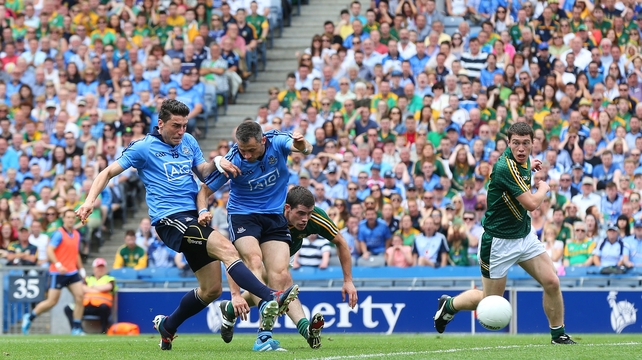
Elsewhere in the province, Westmeath failed to win a competitive match all year. Carlow shipped seven goals against Meath, Offaly remain in the doldrums.
Out west, Mayo, despite a stern test from Roscommon, made it four provincial titles on the trot. Galway did reach an All-Ireland quarter-final but the nature of their loss to Kerry shows they have a bit to go before they can dine with the big boys.
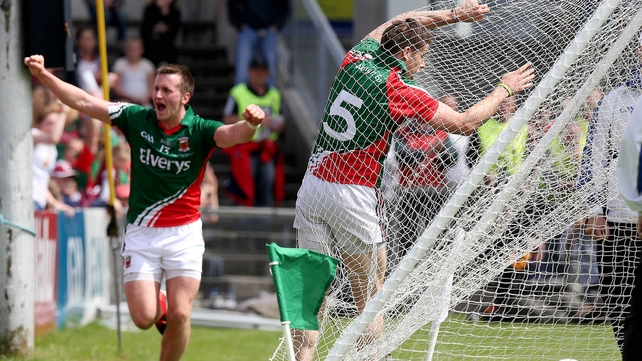
Kevin Walsh is now entrusted with the task of building on the decent work done by Alan Mulholland.
Leitrim’s failure to escape from the Division 4 was a precursor to a poor championship campaign. Sligo, under Pat Flanagan, while not managing to excite, did get to the last 12 in the All-Ireland race.
In Ulster, Donegal deservedly regained the Anglo Celt Cup. Monaghan can take solace from winning promotion back to Division 1 and their subsequent championship wins against Tyrone, Armagh (after a replay) and Kildare. Derry did get to a league final, but the stain of their defeat to Longford no doubt lingered long after the final whistle on 21 June.
The Tyrone revitalisation did not gain much traction in 2014 and Mickey Harte must now plan for 2015 without two of his loyal lieutenants in Tony Donnelly and Fergal McCann.
Cavan also failed to ignite in the summer just past and made their exit tamely at the hands of Roscommon in the qualifiers..
Dublin juggernaut halted abruptly
After their All-Ireland semi-final defeat to Donegal, RTÉ analyst Kevin McStay pointed out that the Dubs were not “properly road-tested” in advance of that game. He is correct, but Jim Gavin & Co. will be disappointed at the way they gave Donegal ‘open road’ to mount forward thrusts that left the 2013 champions reeling.
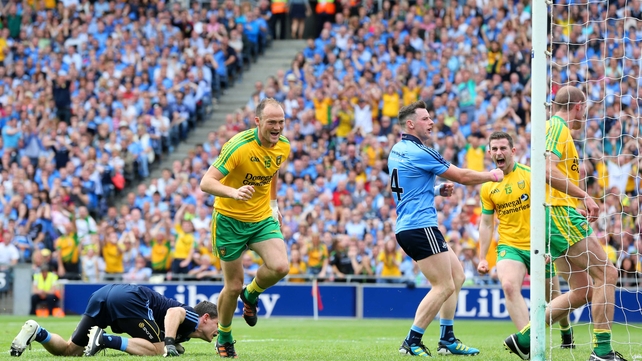
Dublin’s frustration was evident at the game’s end. Their supporters slipped quietly out of Croke Park.
The lessons from that defeat will no doubt be taken on board. To that end, will Dublin be as expansive and free-flowing in those key championship games next August?
There is no denying that they are still the team to beat and the conveyor belt of talent remains in good working order.
So near and yet so far
Mayo’s heartache in search of Sam Maguire goes on. Despite playing with 14 men, their second half display against Kerry in the drawn semi-final was the finest the county has served up at Croke Park for some time. They should have closed out the deal, in spite of the Kingdom sending on ‘Star’.
Mayo folk and other observers were not happy with Cormac Reilly’s refereeing of the replay.Their views had some merit, though Kerry will feel that Reilly didn’t do them any favours either.
Injury meant the Green and Red had to do without Aidan O’Shea and Cillian O’Connor for key moments in the cauldron that was the Gaelic Grounds in Limerick.
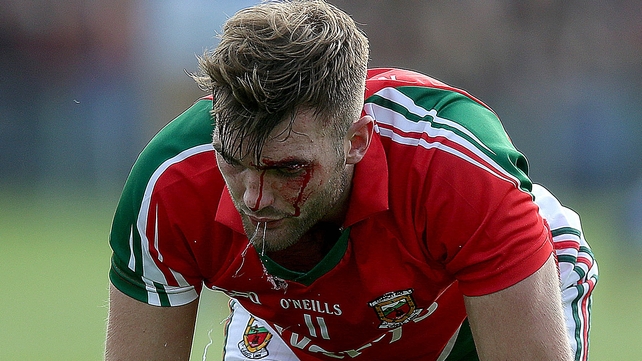
Even if Mayo had felt the Gods were against them, they contributed handsomely to what was an epic contest. Kerry shaded it in the end, but it wouldn’t have taken much for the pendulum to swing back in the opposite direction.
James Horan called time on his tenure in a Limerick hotel shortly after the game. The baton now passes to Noel Connelly and Pat Holmes to see whether they can give Mayo that nudge to finally get them over the line.
What now for the the McGuinness project?
After sweeping Dublin aside, there was a fear that Donegal may not reach the same heights when they faced up to Kerry in the All-Ireland final.Those fears were realised as Jimmy’s men failed to reach the levels they aspired to against the Kingdom.
Will this failure drive them on to make amends in 2015? Will Jim McGuinness remain at the helm? Will the possible retirement of key players destabilise the squad?
More questions than answers it seems amid the hills in the months ahead!
‘Geezer’ back at the helm
Despite losing by a point to Donegal in the All-Ireland quarter-final, the widespread view was that Armagh were the better team on the day. Manager Paul Grimley had a media ban in place, but more relevant was that he, along with Kieran McGeeney, were turning around the fortunes of Armagh football.
In their qualifier win over Meath, the side displayed a level of kick-passing that was a joy to watch. The Orchardmen were eventually undone by Donegal but there is no doubt they are a side on the up.
McGeeney is the now the sole man in charge.
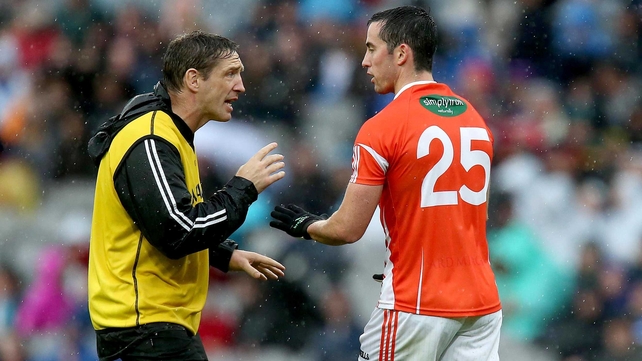
In his six years with Kildare, he had the county competitive, but with no silverware to show for it. The pressure will be on him to deliver the latter in his new role.
The black card
There was much debate at the start of the season as to what impact the black card ruling will have on the game. Statistics released by the GAA show that around 40% fewer cards were issued for disciplinary reasons in 2014.
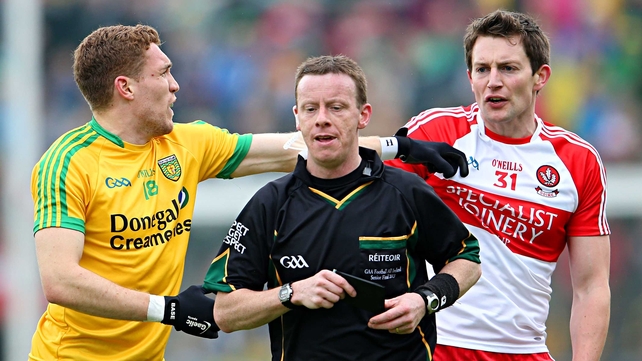
The average number of points per game was roughly 9.5% higher than in 2013, while the instance of goals scored also showed an increase year on year.
A similar trend in 2015 will bode well for the permanent retention of the card.
Watch live coverage of the 2015 GAA Championship draws on RTÉ 2 television from 1900 on Thursday 9 October.
